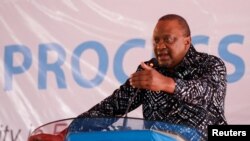A third round of peace talks for the Democratic Republic of Congo has ended in Nairobi with no reported progress toward settling conflicts in the country’s volatile eastern provinces. The talks are coming to an end as the Congolese government accuses the M23 rebel group of killing at least 270 civilians.
The talks ended after a week of discussions between the Congolese people and their government on how to bring peace and stability to the country. The only agreement was for continued dialogue between the government and local communities.
However, the chief mediator at the conference, former Kenyan president Uhuru Kenyatta, serving as peace envoy from the East African Community regional bloc, said this was the beginning of peace in Congo.
He said both sides agreed a 20-year-old war cannot be solved in one day but said they must start a path that brings long-lasting peace. He said there was discussion about how there have been more peace conferences similar to this one with the government, and yet there has been no implementation of the peace agreement. He said this time around, they should not just talk, but also implement what is possible.
Among other things, participants discussed how local communities could benefit from mineral resources, which have been central to most of the armed conflict in eastern Congo.
The meeting in Nairobi will be followed by a more consultations between the Congolese government, led by President Felix Tshisekedi, and rebel groups across the country.
The main rebel group, M23, which has engaged with the Congolese forces in fierce fighting in the east of the country, was not present in the talks.
The fighting has been going on in recent days, despite both sides agreeing to a cease-fire more than a week ago.
The government of Congo said M23 fighters killed more than 270 people in the town of Kishishe.
The United Nations said it received reports of civilian casualties during fighting between M23 and other militias in Kishishe.
Lawrence Kanyuka, the spokesperson for the M23 group, denies the group is targeting civilians and calls for the international community to investigate the deaths.
“The DRC government, who speculated on the lives of people, one minute 150, 120 goes back to 100 dead, but on all those deaths, there is no one identified, there is no list, no names of the people, that’s why we say we need an investigation to happen,” Kanyuka said. “We want a thorough investigation, insist on an independent inquiry to take place.”
Kanyuka accused the government forces and other rebel groups of attacking their positions.
“All frontlines have been attacked most of the time because the DRC government has another agenda and doesn't want any peace to happen in the DRC,” he said. “That's why the coalition forces always attack the M23. If it’s not, it’s going to be somewhere. Basically, all the positions that’s held by M23 are always under attack by these coalitions.”
The East African regional bloc said it will check in on Congo’s dialogue early next year, with the next meeting taking place in the eastern Congolese cities of Bunia and Goma.




